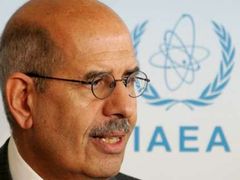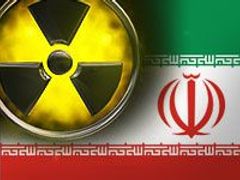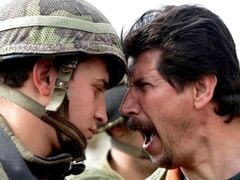Interview - The U.N. Security Council imposed a third round of sanctions on Iran earlier this week for refusing to suspend sensitive nuclear activities.
Iranian nuclear program is one of the most divisive issues of the current world politics. In the run-up to the council meeting in New York Aktuálně.cz met with Iran's chargé d'affaires in Prague, Mr. Majid Nili, to hear Teheran´s side of the argument.
We started by asking Mr. Nili about the newest report produced by the International Atomic Energy Agency (IAEA) and its Director General Muhammad ElBaradei on February 22.
As he explained, the Islamic Republic was asked six questions concerning its nuclear program by the organization. They were aimed at issues such as Iran's tests of plutonium or traces of polonium allegedly found at the Teheran University.
"We are behaving"
"All these questions were answered. And Mr. ElBaradei says in his report he hasn't found anything that wouldn't correspond to the IAEA's rules," said Majid Nili. All documents which the organization requested were handed over, he added.
Being reminded of ElBaradei still allegedly feeling "troubled" over the issue, Mr. Nili argued that it's not easy for the IAEA to resolutely conclude the issue by telling there is nothing wrong with Iran's nuclear program.
"It's a long-term process. There isn't just Iran, there are 121 other countries that are being investigated by the IAEA in the same way and the organization isn't sure about them either. The Nuclear Non-Proliferation Treaty grants every country the right to enrich uranium. Having signed this treaty, Iran has its rights and of course its obligations. The Islamic Republic is cooperating with the IAEA and its own latest report proves it," he explained.
"Our nuclear activities are being examined from 2003 and after all these years, after the whole question had been passed to the UN's Security Council, the IAEA now says: all right, there aren't any deviations from the official procedure."
"Somebody is still raising new issues"
Mr. Nili also complained about a new question of high explosives testing allegedly conducted by Iran being raised a mere week before the report was to be released. "Of course, it was difficult for us to react at such short notice. It is a new topic that wasn't among the questions we have been asked," said Mr. Nili.
"When Mr. ElBaradei was about to notify of a great progress being made in negotiations between Iran and the IAEA, some third party all of a sudden brings a new issue."
In addition, just few days after the report was released, the IAEA has produced another document claiming Iran has been preparing nuclear arms yet after 2003 while according to US intelligence information, all such works were stopped in that year.
"We find this strange. Whenever a general report is to be released, a new thing appears. Secretly, from the US side. Iran wasn't even informed about it. These are not friendly gestures. Establishing trust is a two-way road. ElBaradei's report proves we have already started our part of the journey. Now it's time for the other side to act," claimed Nili.
"According to Mr. ElBaradei, we have never deviated from the standard procedure. Look at the report of American secret services from fall, it says the same: since 2003, there are no evidences of Iran developing nuclear arms. Why, then, somebody tries to pressurize us through the Security Council?" asked Majid Nili.
Recently, we have brought you the first part of the excerpt of the interview with Iran's chargé d'affaires to Prague Majid Nili. The latest report of the International Atomic Energy Agency was discussed then.
The chargé d'affaires criticized that the USA together with other states have prepared a concept for resolution on a new set of sanctions against Iran yet in January 2008, which means before the newest report on the issue was produced by the IAEA.
"It is a paradox. Why would somebody like to make problems to a country without being familiarized with all the facts?" asked Mr. Nili.
"No place for nuclear arms"
Majid Nili also reassured that the Islamic Republic has no intention to develop nuclear arsenal. "Nuclear arms have no place in our ideology. Take this knife, for example: we can use it in two ways. To kill somebody or to prepare food. Nobody can tell you: don't touch this knife as tomorrow you could possibly use it against me," he explained.
"We Iranians need this knife, we need the nuclear energy. We already have gas and oil, but this can end soon. We have to think of the future. Electricity consumption in our country is high," said Mr. Nili, stressing there are 70 million of Iranians in the Islamic Republic.
Being asked whether his country would agree to stop its uranium enrichment program in exchange for security guarantees from the USA and regular supply of enriched uranium, he answered: "We haven't been presented any such offer."
Majid Nili reminded that the UN is far from being united over the issue. "I think that the Chinese, Russians and Americans should adopt more constructive approach following the report's release. There are many states supporting us, for example the Non-Aligned Movement," Mr. Nili said.
(Editor's note: In 2006, all 118 member states of the NAM backed up Iran's right to peaceful nuclear program.)
"Sanctions just make us stronger"
In the next part of the interview, the chargé d'affaires downplayed the impact of sanctions imposed on Iran as having "only small economic effect".
"I think such sanctions make Iranians united and stronger. I believe they make us united because the reasons they are being imposed on us are not just. And it is not only me who thinks so, it is my people as well."
He also reminded the Iran-Iraq war of 1980s when "Iranians remained firm" in spite of all the world supporting Saddam and imposing sanctions on Iran.
"Israel should be constructive"
The diplomat claimed that given its tradition, history and civilization, Iran is determined to play important role in the region.
"Look at Mr. Bush; initially he declared Iran a part of the Axis of Evil, now he is consulting us about how to bring security to Iraq. And it's not only the case or Iraq, but of Afghanistan too. We want to have our region prosperous and stable. We want to offer our neighbors support," said Mr. Nili.
According to him, Iran is supporting Iraq and cooperating with it in spheres of security and economy.
"We don't consider Israel to be a state. Peace is out of the question. We don't recognize Israel," Mr. Nili further explained.
Majid Nili thinks the role of the Jewish state is not constructive. "They should bring in a solution Palestinians would benefit from, but also Muslims, Christians and Jews in the region," he suggested.
"Teheran ready to cooperate with Prague"
Finally, since the Czech Minister of Foreign Affairs recently suggested full diplomatic relations with Iran to be restored and to have a chargé d'affaires in Prague replaced by an ambassador, Mr. Nili was asked about relations between the Czech Republic and the Islamic Republic.
"I take it that in many ways, there is a high potential in cooperation between the Czech Republic and Iran. In political, economic and cultural terms. As you have mentioned, the Czech side has made a certain positive step. This proposal is being discussed. We would like our relations to be based on mutual respect," concluded Mr. Nili.







